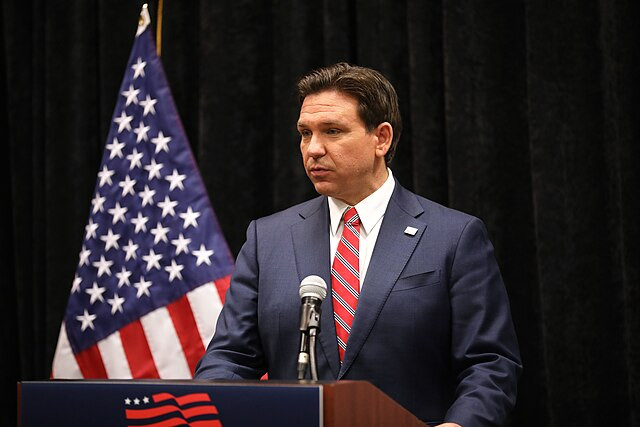A federal judge has issued a temporary injunction against the Florida Department of Health, ordering it to stop threatening local television stations over their decision to air abortion rights advertisements. The ruling, delivered by Chief U.S. District Judge Mark Walker of the Northern District of Florida on Thursday, came in response to what he characterized as unconstitutional intimidation efforts from Governor Ron DeSantis' administration.
The controversy centers around Amendment 4, a pro-choice amendment on the upcoming November ballot, which seeks to repeal Florida's six-week abortion ban and guarantee the right to an abortion until fetal viability. The amendment would undo restrictions imposed earlier this year and ensure greater access to abortion services in the state. Floridians Protecting Freedom, an advocacy group backing the amendment, produced an ad campaign titled "Yes on 4" to rally support for the measure. One ad, titled "Caroline," features a woman explaining that her decision to have an abortion saved her life during a difficult pregnancy.
The DeSantis administration's reaction was swift and aggressive. Local TV stations airing the ad were sent cease-and-desist letters from the Florida Department of Health, which cited a "sanitary nuisance" law. Typically used to address disease risks related to sewage or waste disposal, the law was invoked to suggest that airing the ads could lead to criminal proceedings against the stations. The state argued that the ads contained false information and would be detrimental to the health of pregnant women in Florida.
Judge Walker, however, rejected these claims in a sharply worded ruling. "To keep it simple for the State of Florida: it's the First Amendment, stupid," Walker wrote. "Whether it's a woman's right to choose, or the right to talk about it, the First Amendment prohibits the State of Florida from trampling on [the pro-choice advocates'] free speech." The ruling noted that at least one television station had ceased airing the advertisement as a direct result of the state's threats.
Floridians Protecting Freedom responded by filing a lawsuit against Florida Surgeon General Joseph Ladapo and the health department's top attorney, John Wilson. In their lawsuit, the group argued that the state's threats amounted to "unconstitutional coercion and viewpoint discrimination." Judge Walker sided with the advocacy group, issuing an injunction that prevents the state from attempting to halt the ads until October 29.
Lauren Brenzel, campaign director for Floridians Protecting Freedom, called the ruling a "critical initial victory." She added, "The court has affirmed what we've known all along: The government cannot silence the truth about Florida's extreme abortion ban. This ruling is a triumph for democracy and the sanctity of the First Amendment."
Not everyone was pleased with the ruling. DeSantis' deputy press secretary, Julia Friedland, criticized the court's decision, describing it as "another order that excites the press." Friedland argued that the ads were "unequivocally false" and that Florida's "heartbeat protection law" protects the life of the mother and allows exceptions for victims of rape, incest, and human trafficking.
The ruling comes amid a contentious election season in Florida, where abortion access has emerged as a key issue on the ballot. Amendment 4 is one of nine abortion-related measures being considered by states across the U.S. in the upcoming election. For Amendment 4 to pass in Florida, it needs to receive at least 60% support from voters.
DeSantis has made it clear that he will fight Amendment 4, and the Republican Party in Florida has reportedly spent millions of dollars on ads urging voters to reject the measure. The governor's administration has also been accused of leveraging state agencies against the amendment, with the Florida Department of Health launching a website to campaign against Amendment 4 and the state's Office of Election Crimes and Security investigating alleged fraud in the signature-gathering process for the ballot measure.
In addition to launching investigations, the state recently fined the ballot-measure group $328,000, claiming that fraudulent signatures were submitted during the petition process. The campaign behind Amendment 4, however, has dismissed these allegations as an attempt to intimidate voters and derail the pro-choice movement.
Judge Walker's ruling emphasized that while the state is free to campaign against the amendment, it cannot infringe upon the constitutional right to free speech by silencing opposing viewpoints. "While Defendant Ladapo refuses to even agree with this simple fact, Plaintiff's political advertisement is political speech - speech at the core of the First Amendment," Walker wrote. "The government cannot excuse its indirect censorship of political speech simply by declaring the disfavored speech is 'false.'"






